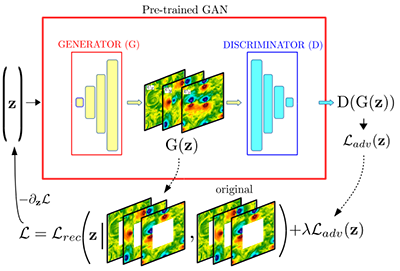Abstract
The direct monitoring of a rotating detonation engine (RDE) combustion chamber has enabled the observation of combustion front dynamics that are composed of a number of corotating and/or counterrotating coherent traveling shock waves whose nonlinear mode-locking behavior exhibits bifurcations and instabilities which are not well understood. Computational fluid dynamics simulations are ubiquitous in characterizing the dynamics of the RDE's reactive compressible flow. Such simulations are prohibitively expensive when considering multiple engine geometries, different operating conditions, and the long-time dynamics of the mode-locking interactions. Reduced-order models (ROMs) provide a critically enabling simulation framework because they exploit low-rank structure in the data to minimize computational cost and allow for rapid parametrized studies and long-time simulations. However, ROMs are inherently limited by translational invariances manifest by the combustion waves present in RDEs. In this work, we leverage machine learning algorithms to discover moving coordinate frames into which the data are shifted, thus overcoming limitations imposed by the underlying translational invariance of the RDE and allowing for the application of traditional dimensionality reduction techniques. We explore a diverse suite of data-driven ROM strategies for characterizing the complex shock wave dynamics and interactions in the RDE. Specifically, we employ the dynamic mode decomposition and a deep Koopman embedding to give modeling insights and understanding of combustion wave interactions in RDEs.
4 More- Received 10 August 2020
- Accepted 20 April 2021
DOI:https://doi.org/10.1103/PhysRevFluids.6.050507
©2021 American Physical Society
Physics Subject Headings (PhySH)
Collections
This article appears in the following collection:

Machine Learning in Fluid Mechanics Invited Papers
Physical Review Fluids publishes a collection of invited papers which advance the use of machine learning in fluid mechanics.


